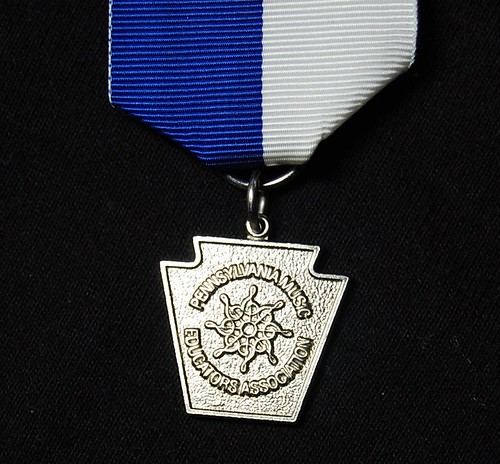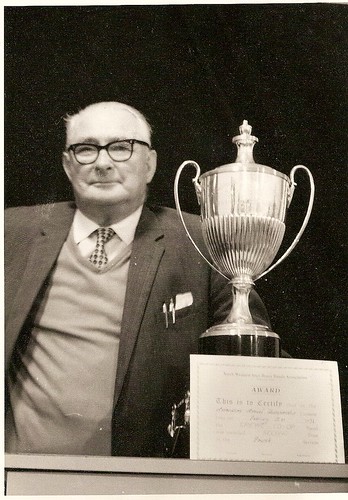
This is a paper I wrote during doctoral coursework almost exactly ten years ago. I have made a few simple edits, but it remains largely unaltered. Interesting how the school funding pendulum has swung this way again a decade later. In any case, I hope you enjoy it.
Rewards (musical and otherwise): A philosophical look at the performance-based music class.
Introduction
If there was one thing I took to heart as I started my Ph.D. it was the need to develop a clearly defined personal philosophy of music education. And if there is one thing I have learned thus far it is this: The more I learn about philosophy, the clearer my ineptitude becomes. As Allen Britton said (1990), “[W]hat one knows, one knows, and what one doesn’t know, one doesn’t know one doesn’t know” (p.183). I am learning more everyday about what I don’t know, but was once sure I did. In this paper I will attempt to articulate my evolving philosophy as it relates to performing ensembles in the secondary schools.
The Purpose of Education
Kliebard (1985) has identified three types of reformists in the history of education in this country: Social efficiency, child-centered, and social meliorists. In short, their views were that schools should do one of the following: Prepare students for specific places within society; focus upon the unique gifts and talents of the student; function as an avenue for social change. As for my personal stance, I am inclined to agree with Jerome Bruner (1996), who talks of antinomies–views that, while they contradict one another, all hold truth. Certainly there are important sides to each of the reform arguments. In addition, I agree with Bruner that we should also consider culture (and the classroom as culture) as an integral component of schooling.
Consequently, I conceive of schools and preschools as serving a renewed function within our changing societies. This entails building school cultures that operate as mutual communities of learners, involved jointly in solving problems with all contributing to the process of educating one another. Such groups provide not only a locus for instruction, but a focus for identity and mutual work. Let these schools be a place for the praxis (rather than the proclamation) of cultural mutuality–which means an increase in the awareness that children have of what they are doing, how they are doing it, and why (pp. 81-82).
It is the word awareness that is key for me. Ultimately students must have an awareness of their educational situation if they are to be successful learners. I believe that this was Dewey’s main concern with the various efforts to reform education. The ultimate purpose of education is rather pointless without careful consideration of the process (experience) in which students interact. In fact, it is through careful consideration of process that the purpose of education takes shape.
In a certain sense every experience should do something to prepare a person for later experiences of a deeper and more expansive quality. That is the very meaning of growth, continuity, reconstruction of experience. But it is a mistake to suppose that the mere acquisition of a certain amount of arithmetic, geography, history, etc., which is taught and studied because it may be useful at some time in the future, has this effect, and it is a mistake to suppose that acquisition of skills in reading and figuring will automatically constitute preparation for their right and effective use under conditions very unlike those in which they were acquired (Dewey, 1938, p. 47).
Lest it be thought that I am avoiding taking a stance, I will attempt to summarize my beliefs as such: The purpose of education is to provide students with opportunities for experiential learning, in such breadth and depth that they are prepared to be successful members of society, contributing in whatever area their interests may lead. Experiences should be designed to reflect the interactions and situations that will be encountered in society.
The Value of Music
We now turn to the question of the value of music. Here again we have a topic upon which an entire dissertation could be based. It almost goes without saying that music educators must be prepared to justify the need for music education. Ironically–at least to me–we do not see teachers in other disciplines facing similar circumstances (it is difficult to imagine math teachers attending a school board meeting to convince members of the need for math education). At the core of the issue is time and money. I say this because we rarely see disagreement on any educational issue that does not have one of these factors involved.
The length of the school day and year has remained unchanged for several decades. Over this same time period however, few would argue that the knowledge base has increased exponentially. New knowledge has not simply replaced old knowledge. If we subscribe to the ideas of Dewey and Bruner, we know that people must have a grasp on what came before a new idea if they are to fully comprehend it. Current events, as they become less “current,” are not forgotten, but rather are slowly added to an ever-increasing historical record. How can students possibly comprehend all that is happening today in the same amount of minutes found in the public schools in (say) 1945? When adults are faced with time constraints in the workplace, the usual solution is to “prioritize.” They start with what is considered to be most critical, understanding that items at the bottom of the list may not be accomplished. It is natural that school boards and administrators, when dealing with a finite number of minutes, will prioritize offerings.
School funding has been a particularly critical issue over the past decade, although most would contend that it has always been an issue to some degree. When dollars are tight, the answer is once again to prioritize. Anyone who has a monthly household budget understands this issue. When there is plenty of money to go around, there is little need to prioritize because we can afford everything we want. When dollars are tight, we start to talk about what we really need, which is sometimes different than what we want.
The reason I raise the issue of time and money is this: Perhaps the justification for music (or art, dance, theater, etc.) would not be front-page news in every music education publication if we, as a nation, reformed school funding and reevaluated the length of the school day/year. I do not think that administrators and school boards are inherently opposed to music education. Rather I think they feel forced to prioritize based upon constraints of time and/or money. Of course, we still must have (as any discipline must) a strong rationale for music education. There are three main reasons that, in my belief, music belongs in our schools.

First, music is an essential form of creativity, expression, and non-verbal knowledge. Now, I fully realize the immensity of that statement and am further aware that the parameters of this paper will not allow for a full explanation of that claim. I will offer this comparison as justification. I believe we can agree that the ability to read and write is highly valued in our society. It would not be out of line to suggest that we teach English so that people have the ability to be creative, express themselves, and interact with our world verbally. This goes far beyond functional literacy, which is obviously important but not sufficient. To read Shakespeare or Robert Frost is clearly not something one does to merely get through the day. To fully grasp the meanings in these works provides a window to understanding humanity more completely. However it is not easily done, and to be able to present one's own ideas verbally is even more difficult, yet is clearly an essential component of participating fully in our society. Indeed, it takes years of experience with the English language–in an educational setting–to gain the insights needed in this regard.
And so it is with music. Music provides us with the ability to intereact with our world in non-verbal ways. I think we are on the cusp of reaching an understanding of the importance of non-verbal ways of knowing. As Michael Polanyi says, "we know more than we can tell." Music cannot be told in words. Music must be experienced to be understood. Creating and expressing oneself musically (with the exception of lyrics) has almost nothing to do with words. It is a unique way of thinking, and yields a unique type of knowledge.
The second reason relies upon the first. That is, if we believe that music is a unique way of knowing, we surely want to educate young people not only to consume music, but to compose and/or perform it as well. Beyond the creative and expressive aspects, it is also an essential means of the evolution of our culture. We dare not leave things out of education that we value so highly as music. To do so is to leave the future of our very culture in question, a gamble we should not be willing to take with anything so essentialy human.
The third reason has to do with the social aspects of music. There are few subjects taught in schools that promote the bringing together of people. Music in a live performance setting has what Peter Kivy (1991) calls a “culturally cohesive effect” (p. 91). This concept, in conjunction with the culture that exists within the musical ensemble itself, presents an interdependent group experience that is truly unique. We do not educate children in musical groups merely out of convenience. It is also because of our awareness that we are not alone in the world. Music, in its completeness, is not a solitary endeavor, it is social.
The Purpose of Music Education
Having mentioned three important reasons for music’s inclusion in schools, we now turn to the question of what music education contributes to schooling in general. This is an extremely broad area, and for the purposes of this discussion I will focus upon my particular area of specialization, which is instrumental music. Of special interest to me is the fact that instrumental music is almost exclusively an elective in the public schools. In other words, students choose whether or not they will study music. I find it interesting to think about the reasons students may “elect” to take a course of study–and particularly why they elect to return in subsequent years. Much of what I will discuss is based upon by own observations during my 9 years of public school teaching–what Bruner (1996) might call “folk psychology.” I have found this type of observation to be extremely helpful as I fuse it with my studies in an effort to form my personal philosophy.
The Concept of Reward
When students make the choice to study music, I believe they do so because they believe it will be worth their time and effort. But that is question begging–where is the payoff, the reward? I believe there are three types of satisfaction or reward that students seek: Affirmational, social, and musical. We will look briefly at each of these areas as they apply to both students and teachers.
Affirmational Reward
It is my experience that students desire regular affirmation as an integral part of the learning process. Ways of receiving affirmation include, but are not limited to: Competition, verbal/non-verbal feedback, and grades. Affirmation through competition can be seen through seating tests, entry into “higher” ensembles, contests, etc. Competition can easily become the focus of a performance-based class–we all know of at least one rehearsal room that is loaded with trophies. In my own experience and studies, I have come to agreement with Johnson and Johnson, as well as other researchers who have shown that cooperative endeavors can include competition, but cooperation is most successful when the competition is external and not amongst the members of the group. For example, I have found great benefit in the rotation of part assignments because it allows for a shared sense of leadership as the students aim towards a common goal. I noticed early in my teaching career that “seating” the students did not seem to help the morale of the group and in fact made the students reluctant to assist in each other’s musical progress.
However, when I taught marching band I was an advocate for competition (in addition to the more traditional service and school-spirit roles). I felt that competition between schools was healthy–and consistent with other activities in the school (that I considered marching band an extracurricular activity was key in the decision to compete). This was an especially important experience for those students who were not athletically inclined/motivated. Competition is a reality in our society, and therefore should have a place–a healthy place–in our schools.

Verbal and non-verbal affirmation is a necessity in any classroom setting, but particularly for students who elect performance-based classes. Performing daily in front of peers and adults can be a highly intimidating experience. On the positive side, affirmation from peers and adults can be a strong contributor to self-confidence. When I resigned from my high school position I received many letters from students, many of whom made mention of the fact that I affirmed them in ways that encouraged them or made them feel good about who they were. It was then that I realized more fully how important affirmation is to students. Sometimes, in an effort to “get the group ready,” teachers (myself included) find themselves too busy to dedicate time to affirming students. This generally indicates a misunderstanding of the educational environment, and specifically calls into question “whose musical experience is it anyway?” But more on that later.
Non-verbal affirmation includes facial gestures, body language, and the like. It is important to remember the deflating power of a sideways glance while conducting (or the dreaded “look of death”). Conversely it is important to remember the affirming power of a smile or nod. Lastly we must remember that all humans enjoy the non-verbal affirmation known as applause. Teachers would do well to remember that, most times, the applause for which they are bowing is intended for the students seated behind them. It is also important to note that, in my opinion, students can tell whether you are taking the bow for them or for yourself.
Grades have been a source of debate for some time. I will not take part in that debate here. I will simply state that assessment is in fact a form of affirmation, and can be a particularly tricky area for music educators due to the subjective nature of performing on a musical instrument. When a student answers “1493” on a social studies exam (concerning Christopher Columbus), it does not take much convincing for him to understand why the answer is “wrong.” But things are not so objective when we evaluate tone, articulation, and so forth. The fact is that society has placed grades in high regard, and therefore students consider their grades to be an indication of their self-worth–it is a form of affirmation. Therefore parameters must be clearly understood by students, and assessment must be regular and structured to reflect the learning experience.
Social Reward
Some aspects of social reward are very obvious. In the high school setting it is typical for students to have been playing an instrument for five years or more. To gather daily with friends year after year and do something fun(!) in school is quite a treat. Every year I would ask our seniors to list their favorite events or moments while in the band program. Time and again, friendships were listed among the favorite memories. It should not be a secret (nor should it be discouraged) that fellowship is an important component of performing ensembles. As previously mentioned, working together toward a common goal is one of the distinguishing factors of the performing arts, and the fact that friendships are cultivated through this learning environment should be cherished and nurtured.
Other social rewards include aspects of citizenship such as self-discipline, accountability, status, and responsibility. While these are clearly extramusical benefits, they are benefits nonetheless and should not be discounted–rather they should be touted, especially because they are important concepts of our society. The important point is that all extramusical benefits should be an outgrowth of the search for musical reward.
Musical Reward

We now turn to what is, at least to this educator, the most critical type of reward. But the challenging part of musical reward is in its definition. I believe that many music educators, if asked what musical rewards their students experience, would cite many of the clearly extramusical rewards already discussed. Indeed in many discussions with my colleagues I have heard of the benefits of teamwork, discipline and the like, which are “only available in band” (choir, etc.)–and are therefore musical rewards. There is a semi-logical reason that many music educators cannot come to grips with true musical reward, and I will discuss that point later. For now I must outline what I believe constitutes musical reward. And once again, this subject could very easily serve as material for and entire dissertation and perhaps more.
I have been grappling with idea of “discovery” or “truth-finding” in music. There are many terms that, I think, run along these same lines. Bruner (1996) refers to “meaning making,” Reimer (1989) to “knowledge of,” and Elliot (1994) “self-knowledge.” We can talk about aesthetics, praxis, constructivism, and so forth, but what I am getting at is not so much the Most Important Thing About Music, but rather the moment in time when an individual comes to a musical understanding, and the associated feeling of satisfaction (reward) that comes from this realization. The musical understanding is “truth” for this individual, for what we come to fully understand in music (or anything) becomes added to the things that we hold to be true. And the greater the struggle, the greater the satisfaction. It is about experiencing music cognitively. I believe this problem solving/discovery approach aligns with Dewey’s views about experiential learning, because without such revelation or discovery there has been no real “experience.” The other important benefit of this “umbrella” is that it allows for many different philosophical ideas to be incorporated. Bowman (1991) has cautioned that perhaps we have become too rigid in our philosophical beliefs, and in doing so have denied our students the opportunity to experience music from a more pluralistic view. It is interesting that teachers can have such strong philosophical allegiances when many times even the authors themselves are the first to say that they do not claim to have all the answers, but more about that some other time.
Whatever the focus of our teaching–which should be determined by the music currently being experienced anyway–the goal should be to lead students to moments of musical reward. And ultimately it is their desire for musical reward that we are looking to cultivate, for this may be the only musical benefit that they take with them. Students who can play an instrument at a highly skilled level will not sustain our musical culture (most do not continue to play after high school) unless they have developed a desire for musical reward. I believe that a desire for musical reward will last, preparing citizens to consume music of the highest quality and partake in cultural/musical experiences long after they have left the rehearsal room. This has everything to do with replicating our society.
The Danger of Folk Pedagogy
Ironic as it may seem, the biggest obstacle between students and musical reward is the teacher. Much of this is due to what Bruner (1996) calls “folk pedagogy.” While most would agree that schooling contributes significantly to the replication of society, we must realize that there is not a magic filter that extracts the good from the bad. Just as a mother realizes she has become just like her mother when she yells “because I said so” for the first time, so too are teachers inclined to assume the ways of their former teachers. No matter how effective undergraduate curricula may be, I believe that the influence of former public school teachers cannot be underestimated. While in many cases this may be of benefit, we must nevertheless strive to analyze the ways we were taught, while at the same time constructing our own individual philosophies.
The Teacher’s Reward

I think I have made it clear that, while there are many types of rewards that music students can reap, musical rewards should be at the core. In fact, I believe that the other types of rewards will come quite naturally as the teacher focuses upon musical rewards. But more on that later. What I want to discuss now is this. What is in it for the teacher? Is the reward structure the same as that of the student? Clearly the affirmational and social structure is not the same for the teacher–at least in the classroom. But what of musical reward? Should the teacher desire and reap musical reward in the classroom? This is an important point that deserves careful consideration.
Largely due to folk pedagogy, it seems quite natural for the music teacher to “realize” a musical composition. That is, the teacher will oftentimes make all decisions regarding the expressiveness of the music, in addition to the usual corrections of notes and rhythms. Reimer (1989) feels that this takes creative artistry away from the students.
A curriculum claiming to be artistic, or musical, or creative, must be a developmental series of leanings about how to get better at being artistic, musical, creative. Creativity cannot be conceptualized as being the sole prerogative of the teacher-director, the students being artisans who only carry out his or her artistic wishes. The students must share in the creativity, under the insightful, unifying governance of the teacher. It will be difficult for many performance directors to give up complete ownership of creativity to become nurturers of it. But when they do, they become music educators . . .(p. 193).
And so it becomes clear that the reward for teachers is not musical at its core, but can be found in the musical rewards of the students. This is both a selfless and counter-intuitive act for a teacher-conductor, particularly if his/her previous teachers seized musical rewards for themselves. Everything in music majors’ pasts tells them that, upon graduation, it is their time. It is their turn to ascend the podium and create the music. In reality, a music educator will allow the musical experience to be explored and “directed” by the students. The true educator may not say “play softer here,” but might ask “what do you think about the dynamics in this phrase?” Does this mean that the teacher gives no direction whatsoever? Dewey (1938) cautions teachers from gravitating too far to the other side of the issue:
The plan, in other words, is a co-operative enterprise, not a dictation. The teacher’s suggestion is not a mold for a cast-iron result but is a starting point to be developed into a plan through contributions from the experience of all engaged in the learning process. The development occurs through reciprocal give-and-take, the teacher taking but not being afraid also to give. The essential point is that the purpose grow and take shape through the process of social intelligence (p. 72).
Just as the math teacher does little good for students by simply providing the answer, so we must be willing to let our students discover their musical way with our guidance (which is different than our direction). But, as long as we continue to be the ones to “take the bow” and stand on the podium, the temptation to direct the students will always be there, especially when we know that we can create a better product through didactic means. We must not fool ourselves into thinking that, because the ensemble sounds “good,” the students have experienced the music. Indeed I think it is completely possible for an ensemble to present an excellent sounding performance without knowing much at all about the essence of the music they are performing. It is not our place to merely manipulate our students musically, nor teach them the part devoid of learning the piece. While it might be acceptable (even preferable) for the professional ensembles to be dictated to, it is not much of an experience for the educational ensemble.
Furthermore, when the director is reaping the musical rewards, he or she is more likely to manipulate the students through the other forms of reward. For example, a director might hold weekly seating tests, not for purposes of musical growth per se, but because doing so will insure that the students practice their parts–laying the groundwork for a “great” performance (and greater musical satisfaction for the teacher). Oftentimes students are so exasperated by this process that they are relieved (instead of joyful) when the concert is over. I can think of few educational injustices greater than this.
Not only should teachers make room on the musical path, but the same holds for affirmational and social rewards as well. Anyone who has hung around the “pub” at a music convention knows that some directors take bands to competition not because they believe it to be a healthy experience for their students, but because they are satisfying their own needs. The same can be said of the director who programs a certain composition because “all the college directors are programming it.” There are many other examples, but I believe these few are enough to raise the following questions. Whose experience is it? Can we be selfless enough to get out of the way and allow our students to reap and desire the rewards associated with their co-operative efforts?
Conclusions
It is the responsibility of our society to educate our children. Education should include all that we hold valuable, which unquestionably includes music. Within music education we have a responsibility to offer students musically rewarding, performance-based experiences. Performance, if it is to be musically rewarding, must be coupled with broad-based understanding, which only comes through in-depth experience in the realization process. Solving musical problems and discovering musical truths are facilitated by educators who understand that their own musical gratification must be relinquished and supplanted by a desire to facilitate their students’ musical rewards.
References
Bruner, J. (1996). The culture of education. Cambridge, MA: Harvard University Press.
Bowman, W. (1991). A plea for pluralism: Variations on a theme by George McKay. In R. Colwell (Ed.), Basic concepts in music education, II (pp. 94-110). Niwot, CO: University Press of Colorado.
Britton, A. (1991). American music education: Is it better than we think? A discussion of the roles of performance and repertory, together with brief mention of certain other problems. In R. Colwell (Ed.), Basic concepts in music education, II (pp. 175-188). Niwot, CO: University Press of Colorado.
Dewey, J. (1938). Experience and education. New York, NY: Simon & Schuster.
Elliot, D. (1994). Music matters: A new philosophy of music education. New York, NY: Oxford University Press.
Kivy, P. (1991). Music and the liberal education. Journal of Aesthetic Education 25 (3), 71-93.
Kliebard, H. (1985). What happened to American schooling in the first part of the twentieth century? In E. Eisner (Ed.), Learning and teaching the ways of knowing (pp. 1-22). Chicago, IL: The National Society for the Study of Education.
Reimer, B. (1989). A philosophy of music education. Englewood Cliffs, NJ: Prentice Hall.
Photo attribution:
http://www.flickr.com/photos/mtsofan/ / CC BY-NC-SA 2.0
 Book reading is much more pleasing on the iPad than on a laptop or an iPhone. The "pages" are about the size of a physical book. This of course brings up the point of whether physical books are better. Well, there is a tactile aspect that cannot be denied. If you prefer that experience, then the iPad will probably leave you wanting. But the iPad has some aspects to it that are either impractical or impossible with "real" books. For example, you cannot read a book in the dark, but you can do so on the iPad. You can also "carry" hundreds of books and magazines with you and have any of them at your disposal instantly. And of course the search, dictionary, and font capabilities are fantastic. For me it is the best way to read. I can't imagine we won't see student textbook migrate to this device. Chiropractor bills alone could justify the cost of an iPad for many students.
Book reading is much more pleasing on the iPad than on a laptop or an iPhone. The "pages" are about the size of a physical book. This of course brings up the point of whether physical books are better. Well, there is a tactile aspect that cannot be denied. If you prefer that experience, then the iPad will probably leave you wanting. But the iPad has some aspects to it that are either impractical or impossible with "real" books. For example, you cannot read a book in the dark, but you can do so on the iPad. You can also "carry" hundreds of books and magazines with you and have any of them at your disposal instantly. And of course the search, dictionary, and font capabilities are fantastic. For me it is the best way to read. I can't imagine we won't see student textbook migrate to this device. Chiropractor bills alone could justify the cost of an iPad for many students.










